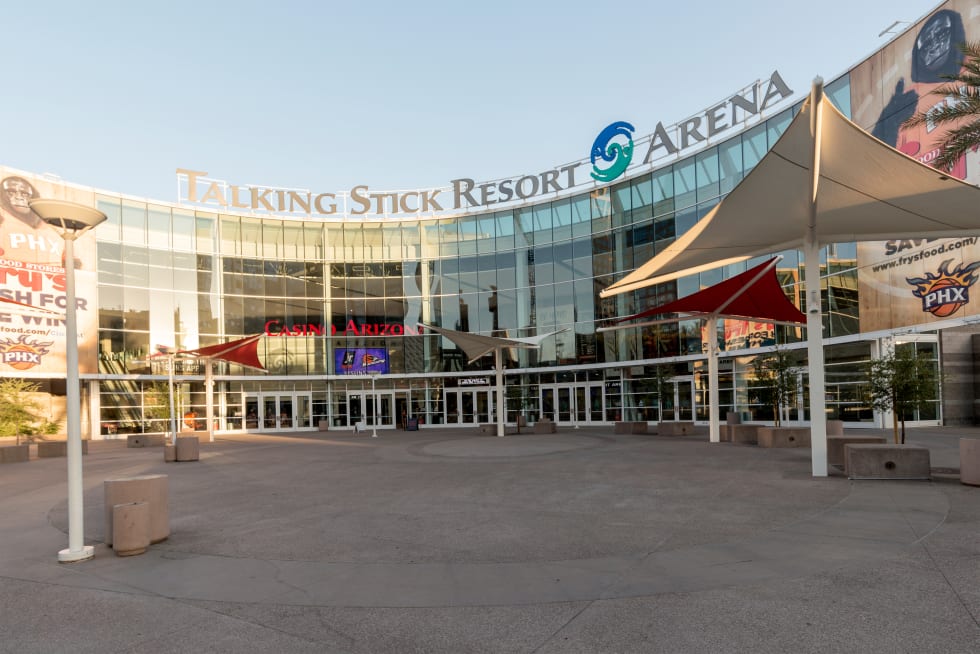Modera Scottsdale
- 105 units available
- 1 bed • 2 bed • 3 bed
- Amenities
In unit laundry, Patio / balcony, Dishwasher, Pet friendly, New construction, 24hr maintenance + more

Arizona's incredible geographical features, including petrified woods, the Grand Canyon, and towering cacti, make it the perfect home for outdoor enthusiasts everywhere.
If you prefer to avoid the notorious Arizona heat indoors, The Grand Canyon State offers a plethora of entertainment opportunities ranging from museums to professional sports games to bars to restaurants and more.
If you've checked off all your relocation must-haves, there's just one thing you'll need to do before finalizing your decision to move to Arizona.
You'll need to consider the cost of living in Arizona and your budget.
This guide will cover everything you need to know about the cost of living in Arizona to help you create your moving budget. Let's dive in!
The average cost of living in Arizona is about 6.4% higher than the national average. Some of its average spending is lower than the U.S. average, including groceries, healthcare, and miscellaneous items. The most significant expenditure in Arizona compared to the rest of the country is housing, followed by transportation. Here is how the data breaks down.
| Cost of Living | Arizona | U.S. |
|---|---|---|
| Overall | 106.4 | 100 |
| Grocery | 96.1 | 100 |
| Health | 97.3 | 100 |
| Housing | 119.7 | 100 |
| Median Home Cost | $407,400 | $338,100 |
| Utilities | 102.7 | 100 |
| Transportation | 107 | 100 |
| Miscellaneous | 93.7 | 100 |
Be sure to remember these figures provide an average across the state. After all, the cost of living can vary across the state of Arizona.
Paradise Valley is among the largest areas of Arizona with the highest cost of living. It's a small town located in Maricopa County and a suburb of Phoenix. The average cost of living in Paradise Valley is 13% higher than the national average, but it's housing is a staggering 833.9% higher than the U.S. average and 19.7% higher than the state average.
| Cost of Living | Paradise Valley | Arizona | U.S. |
|---|---|---|---|
| Overall | 113.0 | 106.4 | 100 |
| Grocery | 114.2 | 96.1 | 100 |
| Health | 92.5 | 97.3 | 100 |
| Housing | 833.9 | 119.7 | 100 |
| Median Home Cost | $3,012,800 | $407,400 | $338,100 |
| Utilities | 101.4 | 102.7 | 100 |
| Transportation | 111.5 | 107 | 100 |
| Miscellaneous | 105.2 | 93.7 | 100 |
Douglas is a small community in Cochise County where the average cost of living is 15.2% lower than the national average and 20.3% lower than the state average.
| Cost of Living | Douglas | Arizona | U.S. |
|---|---|---|---|
| Overall | 84.8 | 106.4 | 100 |
| Grocery | 92.3 | 96.1 | 100 |
| Health | 106.2 | 97.3 | 100 |
| Housing | 39.9 | 119.7 | 100 |
| Median Home Cost | $141,600 | $407,400 | $338,100 |
| Utilities | 106.3 | 102.7 | 100 |
| Transportation | 73.5 | 107 | 100 |
| Miscellaneous | 89.9 | 93.7 | 100 |
Housing costs are generally among the most significant expenses that movers have to contend with in their budget, which is why they make an excellent starting point for any new moving budget.
To help get you started, here’s a breakdown of the average rent price for Arizona's major cities, including Scottsdale, Phoenix, Mesa, and Tucson.
| City | Average 1-Bedroom Rent | Average 2-Bedroom Rent |
|---|---|---|
| Tucson, AZ | $903 | $1,158 |
| Mesa, AZ | $1,187 | $1,335 |
| Phoenix, AZ | $1,137 | $1,356 |
| Scottsdale, AZ | $1,457 | $1,713 |
Renters will find some relief if they're waiting to see prices drop. The rental prices fell everywhere in each of these cities, as much as 3.1%.
As of November, 2024, Tucson offers the most affordable option with an average rent of $903, appealing to those seeking budget-friendly living. Mesa and Phoenix are mid-range options, with average rents at $1,187 and $1,137, respectively, balancing affordability with access to urban conveniences. Scottsdale stands out as the most expensive, with an average one-bedroom rent of $1,457, catering to those looking for a more upscale living experience.
As of November 2024, two-bedroom apartment rents in Tucson remains the most budget-friendly option, with an average rent of $1,158, ideal to prioritize affordability. Mesa and Phoenix offer mid-range choices at $1,335 and $1,356, respectively, blending accessibility with urban living perks. Scottsdale, at the higher end, boasts an average two-bedroom rent of $1,713 for a higher cost of living.
When you rent an apartment and are trying to figure out how to budget, you can follow the recommended 30% rule. Using Tucson, Arizona, as an example, you would need to earn at least $72,581 a year to live comfortably, which is $6,048.42 a month, or xyz an hour. You can also look at the U.S. Census Bureau data to see that the median income in Arizona is currently $72,581 a year, $5,515.50 a month, or $31.82 an hour. You can compare that to the median household income in the United States is slightly higher at $75,149.
This is good news for renters hoping to make a living that correlates to living a reasonably comfortable lifestyle. It's also a good idea to consider MIT's living wage data in Arizona. This is the basic income you need to pay for necessities, from housing to transportation, food, healthcare, and more. It doesn't include student loan repayments, travel, savings, or indulgences. Currently, the living wage in Arizona is $23.40 an hour, which is about $48,672 a year or $4,056 a month.
If you want to redefine what it means to live comfortably and pay for your immediate living expenses, having some money for fun, and keeping a healthy savings funds for emergencies, our data shows that the average Tucson resident spends $4,743 a month, so you may need to earn slightly more than a comfortable wage in order to keep up with your neighbors.
When looking over all of these numbers, you should have an idea of how much you need to earn in Arizona to meet all your needs, with money leftover to do the things you love the most.
Those looking to own in Arizona will also find that median home prices fell everywhere over the last year except Scottsdale, which rose significantly and is 230.9% higher than the U.S. average and 19.7% higher than the state average.
| City | Median Home Price |
|---|---|
| Tucson, AZ | $303,400 |
| Mesa, AZ | $425,900 |
| Phoenix, AZ | $413,000 |
| Scottsdale, AZ | $721,200 |
According to data from MIT's Living Wage Calculator, the average Arizona resident spends $9,890 annually on transportation costs. For a family of four with two children and two working adults, transportation costs increase to $16,589 annually.
Arizona doesn't have public transportation at the state level. Public transportation is handled by individual agencies across the state.
If you're working remotely from home, you may want to consider Arizona. Tempe, which is a 20 drive from Phoenix and 15 minutes from Scottsdale, is one of the best cities for remote workers.

The average Arizona resident spends $4,026 on their grocery bill annually. This expense increases to $11,832 for a family of four.
Here's a look at how much a three-course meal for two (plus gratuity) will cost you in Arizona's major cities. These figures don't include extras like alcohol.
The average Arizona resident spends $2,698 on medical costs annually, while a family of four spends $9,070.
If you have to purchase a health insurance policy on your own, head over to Healthcare.gov to find a policy that meets your needs.
You can find state-specific resources on the Arizona Department of Health Services website. These resources include low-cost care options for women, children, families, and individuals that have specific health care needs.
Generally, moving to a new state means that you'll have a harder time finding providers within your insurance network. Be sure to check in with your current provider to determine your options.
The average monthly cost of utilities in Arizona is $248.44, which includes electricity, fuel, and water. However, depending on where you live in Arizona, utility costs will vary. For example, Tucson's average cost for basic utilities is $299.96, while the average monthly cost in Scottsdale is $284.44.
It can be challenging to estimate your utilities in your budget. However, in the U.S., the average monthly cost for basic utilities is $240. These costs include gas, electricity, and water for your apartment. Furthermore, the average U.S. resident pays $114 for their phone service and anywhere from $64 for their internet service monthly, it's essential to account for these items in your budget.

Regardless of where you live, you'll likely set aside money for entertainment costs every so often. Whether you're funding a hobby, entertainment, or anything that makes you happy, you should include these costs in your budget.
MIT's Living Wage Calculator refers to these costs as civic expenses. The average Arizona resident spends $3,032 annually on civic expenses, while a family of four spends $7,776.
You’ll have to factor in the costs of a monthly gym membership. Here are the average costs of gym memberships in Arizona's major cities, according to Numbeo:
You can also save on gym memberships by finding an apartment complex with an on-site gym and swimming pool to reduce your costs.
Arizona has the unique privilege of being home to The Grand Canyon National Park, The Petrified Forest National Park, and The Saguaro National Park.

Arizona is home to professional sports teams in each of the four major leagues in the U.S. — a luxury that draws many sports fans to the state.
Be prepared to cover the cost of admission, which can range from $39 to $82 on average, depending on the team you want to see playing.
Although Arizona is known for its deserts and cities, the state's mountainous regions provide ample opportunities for those winter sports lovers looking for a cold adventure. Arizona Snowbowl in Flagstaff offers lodging, skiing, snowboarding, and more.
Prices start at $99 for a weekday pass where visitors can choose one day of the week to head to the slopes for the entire season. Choose your day wisely!
The state of Arizona collects a sales tax of 5.6%. In addition to the state sales tax, both counties and cities may levy additional taxes. For example, Phoenix's effective sales tax rate is 8.6%, including the state, county, and city-level tax.
Income Tax: The state of Arizona collects an income tax based on a sliding scale. The sliding income tax rate ranges from 2.59% to 4.50%, depending on your income.** **

Creating an accurate budget means taking all the expenses of your new state. Unfortunately, these costs can be overshadowed or completely forgotten by most budgeters.
To help you avoid that problem, here are some other costs to consider when moving to Arizona:
If both you and your budget are ready to make the move to Arizona, it's time to get started on your search for the perfect apartment.
Learn about the best places to live in Arizona. and the cheapest places to live there.
Get started with our easy quiz to help you get matched with the perfect apartment in Arizona.
Arizona rents vary by city, with prices ranging from budget-friendly options in Tucson to premium rates in Scottsdale:
The cheapest rent in Arizona is a one-bedroom apartment in Tucson. You’ll spend an average of $903 for a one-bedroom apartment in Tucson.
Single adults in Arizona will spend an average of $9,890 a year on transportation. A family of four will spend around $16,589 on transportation each year. Single adults will spend an average of $4,02 a year on food. A family of four with two kids will pay $11,832 a year on food.
Yes, Arizona is cheaper than California. However, your rents will also vary depending on where you live. A one-bedroom apartment in Tucson costs $903. A one-bedroom apartment in San Diego costs $1,962. A one-bedroom apartment in Scottsdale costs $1,457. A one-bedroom apartment in Los Angeles costs $1,853.
Arizona to Texas is 825.7 miles apart. It takes 13 hours and 33 minutes to get between Arizona and Texas.
It is 736.9 miles between Arizona and California. It takes about 13 hours and 57 minutes between Arizona and California.
According to the U.S. Census Bureau, the entire population of Arizona is 7,431,344.
When planning a budget while renting an apartment, following the 30% rule can be a helpful guideline. For example, in Tucson, Arizona, you would need an annual income of at least $72,581—or $6,048.42 per month—to live comfortably. Interestingly, according to U.S. Census Bureau data, the median income in Arizona aligns closely with this benchmark at $72,581 per year, or approximately $5,515.50 per month and $31.82 per hour.
For renters aiming to maintain a balanced lifestyle, this data offers some encouraging insights. Additionally, considering MIT's living wage data for Arizona can provide a clearer picture of the income required to cover basic necessities such as housing, transportation, food, and healthcare. The living wage in Arizona currently stands at $23.40 per hour, which translates to about $48,672 per year or $4,056 per month, excluding expenses like student loans, savings, or leisure activities.


In unit laundry, Patio / balcony, Dishwasher, Pet friendly, New construction, 24hr maintenance + more
In unit laundry, Wine room, Patio / balcony, Dishwasher, Pet friendly, New construction + more